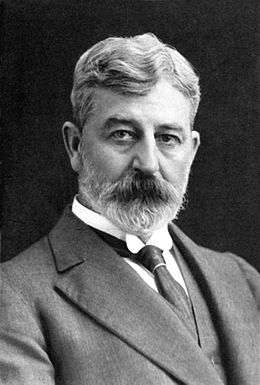William Schreiner
| The Right Honourable William Philip Schreiner CMG QC | |
|---|---|
 | |
| 8th Prime Minister of the Cape Colony | |
|
In office 13 October 1898 – 17 June 1900 | |
| Monarch | Victoria |
| Preceded by | John Gordon Sprigg |
| Succeeded by | John Gordon Sprigg |
| Personal details | |
| Born |
30 August 1857 Wittebergen Mission Station, Cape Colony |
| Died |
28 June 1919 (aged 61) Westminster, County of London, United Kingdom |
| Spouse(s) | Frances Hester Reitz |
| Children | Oliver Schreiner |
| Alma mater |
University of the Cape of Good Hope University of London Downing College, Cambridge |
| Profession | Barrister, Politician |
William Philip Schreiner CMG QC(30 August 1857 – 28 June 1919) was a barrister, politician, statesman and Prime Minister of the Cape Colony during the Second Boer War.
Career
Schreiner was born at Wittebergen Mission Station near Herschel, Eastern Cape. He was the tenth child of two missionaries Gottlob Schreiner and his wife, the former Rebecca Lyndall, and a younger brother of the writer Olive Schreiner. He was educated at Bedford, the South African College in Cape Town, the University of the Cape of Good Hope, the University of London and Downing College, Cambridge. He took a First in the London LL.B. examination and was senior jurist in the Cambridge Law Tripos.[1] He was admitted to the English bar in 1882, returned to Cape Town as an advocate of the Cape Supreme Court and established a thriving law practice.

Schreiner became a parliamentary draughtsman in 1885, and acted as legal adviser to the gGovernor and high commissioner in 1887. His proximity to parliamentarians gave him an entrée to political life, and in 1893 he was elected member of the Cape Parliament for Kimberley. That same year he became attorney-general in Cecil Rhodes's cabinet, which was supported by Jan Hendrik "Onze Jan" Hofmeyr and the Afrikaner Bond until the Jameson Raid, when Rhodes's imperial ambitions became clear, causing the resignation of Schreiner and the rest of the ministers in January 1896.
Schreiner was elected member for Malmesbury in 1898 and later that year became prime minister himself, heading a cabinet that included John X. Merriman and Jacobus Wilhelmus Sauer. As prime minister Schreiner favoured negotiation rather than hostilities, to the chagrin of the governor and high commissioner, Alfred Milner, who was actively fomenting war. Schreiner was forced to resign from the premiership and from Parliament in June 1900.
He failed to win a seat in 1904, but returned in 1908 as the member for Queenstown. He now adopted a liberal Bantu policy, influenced by a visit he had made in 1899 to the Transkei and the African leader John Tengo Jabavu. Schreiner advocated integration and equal rights for all "civilised" men. His dedication to this ideal was proved by his resignation from the National Convention in order to represent Dinuzulu, who was due to stand trial before a special court set up by the Government of Natal for his alleged treasonous participation in the rebellion of 1906.
Schreiner felt that the Union Government and Parliament proposed for South Africa would not uphold the liberal Bantu policy of the Cape Colony, so he went to London to oppose the passage of the South Africa Act through the British Parliament in 1909. With the forming of the Union in 1910 he became one of the first senators nominated to look after Black interests.
Schreiner was on holiday in England at the outbreak of the First World War and was asked by Gen. Botha to fill the post of High Commissioner for South Africa in London. He died in office on 28 June 1919, the day the Treaty of Versailles was signed.
Schreiner was married in 1884 to Frances Hester Reitz, a sister of President F. W. Reitz. They had four children, including Oliver Schreiner, who became a judge.
Notes
- ↑ "Schreiner, William Philip (SCRR878WP)". A Cambridge Alumni Database. University of Cambridge.
References
-
 Chisholm, Hugh, ed. (1922). "Schreiner, William Philip". Encyclopædia Britannica (12th ed.). London & New York.
Chisholm, Hugh, ed. (1922). "Schreiner, William Philip". Encyclopædia Britannica (12th ed.). London & New York.
External links
- Portraits of William Schreiner at the National Portrait Gallery, London
- The papers of WP Schreiner held by the University of Cape Town Libraries.
| Preceded by John Gordon Sprigg |
Prime Minister of Cape Colony 1898–1900 |
Succeeded by John Gordon Sprigg |
